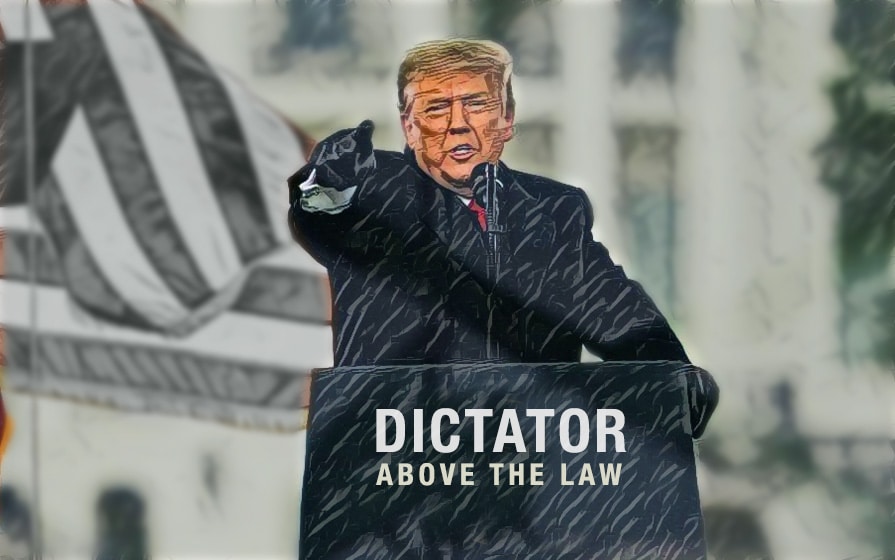It is widely reported from Trump’s recent speeches that he wants to control our political system as a dictator above the law, where he can jail his political opponents and put in his own generals and law enforcement officers. Here is why another Trump presidency as a dictator poses a significant threat to democracy:
- Suppression of Civil Liberties: Dictatorships often restrict fundamental human rights and civil liberties. Freedom of speech, assembly, and association are curtailed, limiting the ability of citizens to express their opinions and participate in civic activities.
- Lack of Political Pluralism: In a dictatorship, political power is concentrated in the hands of a single leader or a small group, leaving no room for political diversity. This absence of political pluralism undermines the principles of democratic governance, where a variety of voices and perspectives should be represented.
- Absence of Rule of Law: Democracies are built on the foundation of the rule of law, where laws are applied equally to all citizens. Dictatorships, on the other hand, often lack an independent judiciary and legal framework, leading to arbitrary and unfair application of laws.
- Erosion of Democratic Institutions: Dictatorships tend to weaken or dismantle key democratic institutions such as a free press, an independent judiciary, and legislative checks and balances. These institutions play a crucial role in maintaining the balance of power in a democracy.
- Limited Accountability: In a dictatorship, leaders often operate with little to no accountability. This lack of accountability can result in corruption, abuse of power, and disregard for the welfare of the citizens.
- Suppression of Political Opposition: Democratic systems thrive on healthy political competition and the existence of opposition parties. Dictatorships, however, frequently suppress political opposition, stifling the democratic process and preventing the peaceful transfer of power.
- Limited Civic Participation: Democracy encourages active civic participation, including voting, engaging in public discourse, and participating in civil society. Dictatorships, by their nature, restrict such participation, limiting the ability of citizens to influence political decisions.
- Vulnerability to Authoritarianism: The transition from a dictatorship to a democratic system can be challenging, and there is a risk that authoritarian tendencies may persist even after a transition. This can hinder the establishment of a stable and truly democratic government.
In summary, dictatorship undermines the core principles of democracy by suppressing individual freedoms, limiting political pluralism, eroding democratic institutions, and fostering an environment of limited accountability and civic participation.
Here is an excellent point about dictators, produced by The Lincoln Project:
The World History of Dictators
Dictators have played a significant role in shaping the course of history over the past 90 years. From the early 20th century to the present day, various leaders around the world have risen to power, often employing authoritarian tactics to control their nations. They essentially eliminate their political opponents and control from within from a state of being above the law and destroy anyone who tries to take their power. The examples below are of dictators who didn’t end well or are still in power and their people are afraid of them.
Here are some notable facts concerning dictators during this period:
- World War II Era:
- Adolf Hitler (Germany, 1933-1945): Hitler, as the leader of Nazi Germany, pursued aggressive territorial expansion and was responsible for the genocide known as the Holocaust. His dictatorship led to the deaths of millions and played a central role in World War II.
- Cold War Period:
- Joseph Stalin (Soviet Union, 1924-1953): Stalin was a key figure during the early years of the Soviet Union. His rule was marked by purges, forced collectivization, and industrialization. The Stalinist era saw the Soviet Union emerge as a superpower after World War II.
- Mao Zedong (China, 1949-1976): Mao, the founding father of the People’s Republic of China, implemented radical social and economic policies such as the Great Leap Forward and the Cultural Revolution. His rule had profound and lasting effects on China.
- Post-Cold War Period:
- Saddam Hussein (Iraq, 1979-2003): Saddam Hussein’s regime in Iraq was characterized by authoritarian rule and human rights abuses. His invasion of Kuwait in 1990 led to the Gulf War, and his subsequent actions led to the Iraq War in 2003.
- Muammar Gaddafi (Libya, 1969-2011): Gaddafi’s rule in Libya spanned over four decades. His leadership was marked by authoritarianism, human rights violations, and support for international terrorism. The Arab Spring uprising in 2011 ultimately led to his downfall and death.
- Contemporary Dictatorships:
- Kim Jong-un (North Korea, 2011-present): As the Supreme Leader of North Korea, Kim Jong-un continues the legacy of his family’s dynastic rule. The country is known for its isolationist policies, human rights abuses, and nuclear weapons development.
- Vladimir Putin (Russia, 1999-present): While not a traditional dictator, Putin’s leadership style in Russia has been characterized by centralized power and suppression of political opposition. His influence extends beyond his formal terms in office.
Dictatorships in the past 90 years have left a lasting impact on global politics, societies, and the lives of millions. The actions and policies of these leaders have shaped the narrative of their respective nations and continue to be subjects of historical analysis and debate.
Our country was formed on the principle of the constitution and the idea of three branches of government being controlled for and by the people of the United States of America. Our country depends on everyone getting out to vote for our leadership and at this point we need Joe Biden as president to keep our democracy strong.
 By Peter McKinnon with help from OpenAI chat
By Peter McKinnon with help from OpenAI chat

